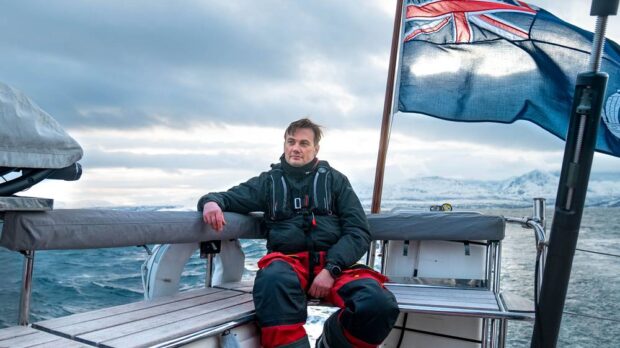Norway’s Supreme Court has overturned the Hålogaland Court of Appeal and Nord-Troms and Senja District Court’s acquittal of the British-Russian businessman Andrey Yakunin, the son of former head of state-owned Russian Railways Vladimir Yakunin, with the judgment that the flight ban against Russian citizens includes drone flights.
The background for the repeal is that the Supreme Court has concluded that drones fall under the term “aircraft”, and with that decided that in the sanctions provisions it is illegal for Russian citizens to fly drones in Norway and Svalbard.
The verdict was decided with three voting in favor and two voting against.
– A 3-2 decision in the Supreme Court on the legality of the regulation does not resolve this case, writes Yakunin’s lawyer, John Christian Elden in a text message to NRK.
Yakunin spent 51 days in custody for flying a drone in Svalbard during a sailing trip last summer.He was accused of violating the sanctions that prohibit Russian citizens from flying drones in Norwegian airspace.
He was acquitted in both Nord-Troms District Court and Hålogaland Court of Appeal. They believed that drones are not covered by the flight ban imposed on Russian citizens.
The Supreme Court has previously ruled that it is illegal for Russians to fly drones . That is why there has been great excitement about what the Supreme Court now decides in Yakunin’s case, and whether they are willing to put their own decisions aside .
There will be a new round in the district court
The verdict in the Supreme Court means that Yakunin’s case will now be taken up in the district court again.
It is on the basis that the judgment clarifies the scope of the flight ban in § 19 of the sanctions regulations. The Supreme Court concludes that it also covers Svalbard. The District Court and the Court of Appeal concluded that drones were not to be regarded as “aircraft” in the sanctions regulations, and came to an acquittal because of that.
Now that the Supreme Court has decided that the drones are covered by the sanctions regulations, the district court will take up the case again.
Elden hopes that a decision will be taken here on other legal issues.
– They have not considered the other legal issues in the case, such as whether the sanctions rules apply to persons with dual citizenship or whether the Norwegian government can discriminate against Russians in Svalbard after the Svalbard tract. These questions must now be dealt with in their full breadth by the district court, writes Elden in the press release.
With its ruling on Friday, the Supreme Court decides that also other Russian citizens in the future are not allowed to fly drones in Norwegian airspace.
Yakunin himself told the Barents Observer that he and other expedition team members used the drone to scout for the best route to climb to the top of Kvasspiggen near Magdelenefjorden in the very north of Spitsbergen Island in the Norwegian Arctic.
TYakunin says to the Barents Observer he has observed how courts in Norway have been trying to determine how best to interpret the sanctions that are in place.
“The aim of the sanctions is very clear: to impair the Russian government’s ability to wage war in Ukraine. It is important to mind the spirit of the law, especially when that spirit might, to some degree, contradict the letter of the law. I am confident that the Norwegian judicial system will eventually agree with the basic message I keep on repeating: it is no offence for a Russian-British (or any other) man/woman to fly a hobby drone in Svalbard,” Andrey Yakunin says.
He adds a hope that a new hearing in the district court in Tromsø will acquit him from the charges.
“Sadly, it will take more time and at least one more court hearing for it to become an established legal fact – flying a hobby drone on Svalbard is not a criminal offence for a Russian-British national. Until then, I remain committed to proving my innocence in a court of law and to getting justice — over and over again if need be.”
Yakunin’s lawyer said that the Supreme Court decision did not signify the final decision in the case. He noted that the court did not take into consideration other legal questions related to the case, for example, whether the ban on using drones applies to people with dual citizenship — Yakunin Jr. is a citizen of both Russia and the UK.
Andrey Yakunin was arrested on 17 October 2022. He was accused of flying his drone on Svalbard, while staying on his yacht; the drone use is a violation of sanctions legislation. The sanctions prohibit Russian nationals from operating planes and drones in Norway.
In court, Yakunin explained that he did not know about the ban on drone use for Russians. The prosecutor’s office requested 120 days in prison for the man, however the court decided to set him free. The police appealed the decision on the same day. On 2 November, the appeals court ruled that Yakunin should be kept in custody for four weeks, pending trial.
In December, the appeals court allowed Yakunin to be released from the detention centre he was held in. The court ruled that the ban on drone use did not apply to small drones. The Supreme Court, however, stated in the new ruling that the ban does apply to all drones after all, seeing as they’re considered “aerial vehicles”.
Photo: Andrey Yakunin is British-Russian, but identifies mostly as British. He is the son of a Russian oligarch who is said to have close ties to Putin. HANNE WILHELMS / NRK
Sources: NRK; Novaya Gazeta; Eye on the Arctic

